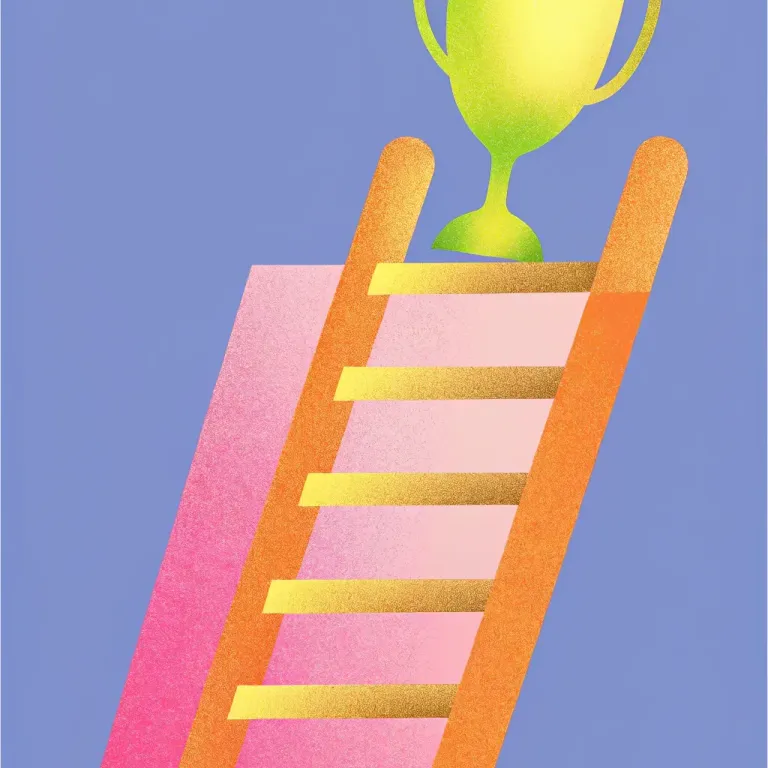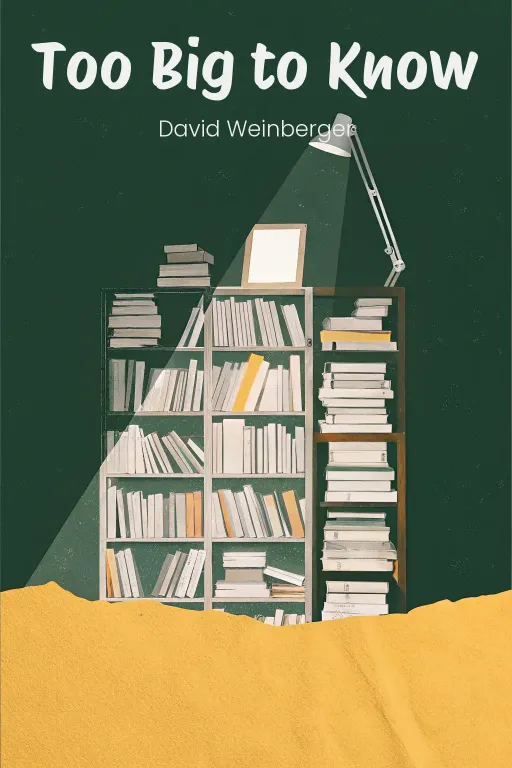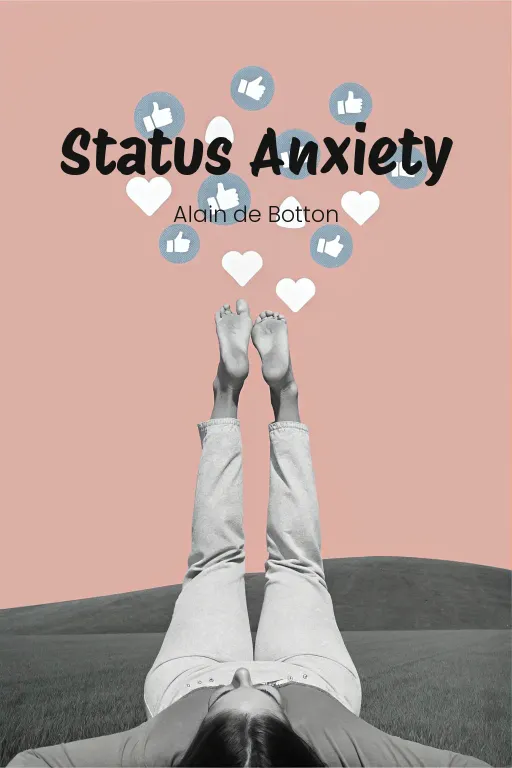
Escape the Status Trap
Podcast by The Mindful Minute with Autumn and Rachel
How social isolation and meritocracy cause fear of underachievement and how to solve this
Introduction
Part 1
Autumn: Hey everyone, welcome to the show! Let's jump right in with a relatable question, shall we? Rachel, you ever get that little pang of, I don't know, anxiety, maybe, when you see someone your age driving a fancy car or, like, nailing their dream job? That quiet feeling that you're maybe not quite where you “should” be? Rachel: Autumn, please, who hasn't felt that? Unless, of course, you are that person posting the car, right? And even then, just keep scrolling, and you'll find someone with an even fancier car to make them feel inadequate. It’s a never-ending game. Autumn: Exactly! And there's actually a name for this: status anxiety. It's that subtle, but persistent, pressure we put on ourselves to measure up, based on how society defines "success". Alain de Botton's book, Status Anxiety, really dives into this. He explores why so many of us feel this way, and, more importantly, what we can actually do about it. Rachel: Yeah, de Botton really doesn't pull any punches with this one. He dissects everything - from the meritocratic ideal we're constantly bombarded with, to this deep-seated need we all seem to have for validation and approval. But here's where it gets interesting: he offers some pretty provocative solutions. I'm talking philosophy, art… even rethinking our entire value system. Bold stuff. Autumn: Right, so, in today's episode, we're tackling three big ideas. First, we'll look at how status anxiety really chips away at our mental and emotional well-being. Then, we're going to dig into the societal things that keep us trapped in this endless status race. And finally, we're going to explore some creative and philosophical solutions. Ways to basically redefine success on our own terms, and maybe, just maybe, escape the comparison trap altogether. Rachel: So, it’s like breaking free from some kind of mental cage, and asking ourselves: if society’s ladder is a bit of a con, why not just build our own? Alright, let's dive in!
The Nature of Status Anxiety
Part 2
Autumn: Okay, so let's dive in. What exactly “is” status anxiety? Alain de Botton, he defines it as this really deep-seated fear, almost a gut feeling, that you're just not measuring up. Not meeting society's standards of success, you know? It's that worry that we're not achieving enough, or not being seen, or even not being loved because of where we're at on society's ladder. Which, by the way, is always changing. Rachel: Right, it's like the shyer cousin of burnout and imposter syndrome. But, you know, it’s fascinating that it's not just about money or flashy titles. It goes so much deeper. It's about being seen, and ultimately, about feeling loved. Autumn: Exactly! De Botton argues that status isn't just about having fancy things. It’s an emotional reward. It’s tied to admiration and affection, those things that are hard to put your finger on. He points out that status used to be about things like being from a noble family, or even divine right! But with the rise of meritocracy, well, the game completely changed. Rachel: Meritocracy, where success is supposedly based on talent and hard work. I mean, in theory, fairness and liberation sound great, but in reality? It's a pretty brutal system. It basically says, “If you’re not successful, it’s all on you.” No pressure, right? Autumn: No pressure at all! <Laughs> And that's where the emotional stakes get really high. If your status determines whether you're admired or ignored... well, that's a lot to carry. Here's the crazy thing. Striving for status can drive us, but it also makes us really fragile. You're always comparing yourself, always afraid of falling behind. Rachel: It’s like running a race that never ends. Even if you win one lap, there’s always someone ahead in the next one. And then social media piles on. You see these perfectly curated lives—luxury travel, dream homes, amazing bodies—and it makes you feel like you're just... not enough. Autumn: Exactly! And De Botton nails it when he calls status anxiety a "silent agony." It’s this thing that secretly eats away at our self-esteem. It's not just about competing with others. It's about how much we buy into these messages society sends us. Rachel: Okay, so here's what I'm wondering, If it's all about what everyone else thinks, why don't we just... not? Why don't we just stop caring? Autumn: Oh, easier said than done! De Botton uses thinkers like Adam Smith and William James to explain this. Smith said that wealth isn't just about what it buys; it's about the respect it gets you. And James saw recognition as a basic human need. As basic as food and shelter! It's on a really primal level. Rachel: Wow, that's a sobering thought. If being recognized is as important as surviving, then I guess it makes sense that we're all chasing status. But then, what about the people who are, you know, invisible to society? Autumn: That's such a key point. De Botton uses Adam Smith's observations about poverty to illustrate this. He talks about the "invisible lives" of those who aren’t acknowledged. People who go unnoticed, whose existence seems to fade away when they're not validated. Rachel: That's heavy. It's like living as a ghost. Society doesn’t just ignore these people; it brushes them aside, reinforcing that invisibility. Autumn: Right, and this ties into bigger issues. De Botton argues that status anxiety isn’t just a personal thing. It’s built into how society works. The unrecognized aren’t failing on their own; they’re casualties of a system that values worth based on productivity and visibility. Rachel: And the psychological cost? Brutal. Rejection breeds resentment; invisibility breeds shame. It creates this ripple effect, not just for the individual, but for everyone. Autumn: Exactly, this is the big paradox we have to face. On one hand, chasing status drives progress! It's behind innovation, social advancement, and culture. But on the other hand, it leaves so many people behind, struggling with shame and feeling inadequate. Rachel: So here’s the million-dollar question: if it’s so messed up, why do we keep playing this game, right? Is it fear, is it tradition, or is it just that we're creatures of habit? Autumn: Honestly, it's probably a mix of all three! But De Botton says that breaking free starts with rethinking what we value. We need to challenge the standards that society imposes, and make our own. Rachel: Okay, so we redefine success. But what does “that” actually look like? Do we turn to philosophy? Become a bohemian? Or do we just tear down the whole system? Let's keep digging.
Causes of Status Anxiety
Part 3
Autumn: So, understanding the roots of status anxiety really takes us to its societal causes. Alain de Botton points to five main things: lovelessness, expectations, meritocracy, snobbery, and economic dependence. These aren't just abstract concepts, right? They're deep forces that affect how we see ourselves. Let's kick off with lovelessness. I think it really sets the stage for why status anxiety hurts so much. Rachel: Lovelessness, huh? Sounds like a heavy theme from a Russian novel. Are we talking about just personal relationships, or is there something bigger at play here? Autumn: It’s both actually. De Botton kind of reinterprets Adam Smith’s idea of recognition as a societal form of love. He says we humans need to feel valued and seen by others, aside from just romantic love. Our self-worth depends on being respected and admired by society. When that recognition is missing, it feels like emotional neglect, you know? Rachel: Yeah, that makes sense. If love is about valuing someone for who they are, then being ignored is like... a void! But how does this connect back to status specifically? Autumn: Well, De Botton uses Smith’s example of the rich man who enjoys his wealth not for practical reasons, but because it gets him attention. And, on the flip side, Smith describes the poor man as "unheeded," like someone who just moves through life unseen. It’s not just about the money, though. Wealth becomes a symbol of recognition and status. Without it, people feel isolated, like they don’t matter. Rachel: It’s a tough pill to swallow – people chasing wealth, not for the stuff, but for the applause it brings them. Suddenly, success looks totally different. It's like saying if no one is clapping, then what's the point? Autumn: Exactly! And it’s insidious because society links recognition to material success. Achievements, wealth, fancy titles – they become symbols of worth. When recognition is missing, people think they've failed personally, like their own value doesn’t cut it. It’s like this cycle where external validation stands in for self-love. Rachel: And, obviously, people who already “aren’t seen” by society get hit hardest. De Botton's metaphor of invisibility is really powerful. Whether it is social status or just feeling like a nobody in a crowded world, being unseen messes with your identity. Autumn: Totally. And it gets tougher with meritocracy, which is our next cause. It's this idea that you can rise to the top based on your hard work and talent. Sounds empowering, right? But… it’s a slippery slope to doubt and shame when things don’t go as planned. Rachel: So, let me guess: under meritocracy, failure isn’t a systemic issue. It’s personal. It’s not “I didn’t win because the game is rigged." It’s “I didn’t win because I wasn’t good enough." Autumn: That’s pretty much it. De Botton criticizes meritocracy, saying it feels fair but oversimplifies things cruelly. Take corporate culture, for example. Workplace success is often treated as a perfect reflection of merit, with supposedly unbiased reviews and promotions. But this ignores things like privilege, inequalities, and just plain luck. Rachel: It’s kind of funny that you bring up luck. No one really wants to admit how much of success is just chance, do they? Like, born into the right family, meeting the right mentor, or hitting the right trend at the right time – it’s like Monopoly where some players own half the board before the first roll. Autumn: Exactly, but the meritocratic myth doesn’t account for that. If someone doesn’t gain status, they face external judgment and also internalize it. They think, “I failed because I wasn’t talented or hardworking enough.” And that shame is pervasive, even when the deck was stacked against them from day one. Rachel: Wow, so no wonder status anxiety is everywhere. You’re constantly measuring yourself against a rigged system and blaming yourself for not measuring up. What does De Botton say about the other side – people who actually make it to the top of the ladder? Autumn: Well, it’s a paradox. Even the so-called “winners” aren’t free from anxiety. Success comes with its own pressures – the fear of losing status, the constant comparison to others who have risen higher and then there’s envy. De Botton says envy hits hardest when it comes from those closest to us, like, our peers, colleagues, and friends, as opposed to someone wildly out of our league, like a billionaire, you know? Rachel: The classic "keeping up with the Joneses." Except now, let’s face it, envy isn’t just about neighborhood lawns or cars. It’s LinkedIn, Instagram, even TikTok – people constantly flaunting their promotions, vacations, and curated lifestyles. There’s really no escape. Autumn: You’re so right. Social media amps up meritocratic anxieties tenfold, turning life into a highlight reel where everyone seems more successful. And here’s the kicker: If people do achieve great success, the goals keep moving! It’s never enough. That’s what makes meritocracy so emotionally draining. Rachel: Which naturally leads us to snobbery – the idea that society judges people through these ridiculous surface-level markers of success, like job titles. Let's talk about the loaded question of "what do you do?" Autumn: Yeah, snobbery is exactly that. De Botton emphasizes how our jobs have become status shorthand. The minute you say you are a surgeon, an artist, or a plumber, judgments start flying, right? Society ranks you, whether consciously or not, based on how prestigious your work seems. Rachel: Exactly, it is like people “light up” at a job they respect, or they politely nod when they don't. It is so obvious. You are either seen as worthy, or you are invisible. Autumn: And it’s so limiting! It’s not just about the person being dismissed; it dehumanizes everyone. Snobbery reduces everyone to a single label. At the same time, it creates anxiety even for people with "high-status" jobs because they are terrified of falling from grace. Rachel: Exactly! It seems like society is like that. You’re always anxious about your status no matter where you are. Now, this need to keep climbing is reinforced by the final point that we'll discuss today which is economic dependence. Autumn: De Botton says that, today, our jobs are not just about collecting our paycheck, they're also key in shaping our identities. We've made being employed the main determinant of value. But there is a downside. Since the job markets are so unpredictable, people face layoffs or financial instability. And then their social value crumbles too. You see, it’s very destabilizing. Rachel: Sounds like you are walking on a tightrope. You know, even talented people could get pulled under by things they don't have control on such as the crash market. And yet society blames you for not working hard. Autumn: Yeah, that is so true. This reliance on work for recognition puts so much strain on us. So when status comes from employment, losing a job isn't just a loss of money, it's a personal collapse, you know? It's existential. Rachel: So, each factor—lovelessness, meritocracy, snobbery, economic dependence—forces people to engage in this relentless pursuit of status that's exhausting at every level.
Addressing Status Anxiety
Part 4
Autumn: So, after digging into the causes, let's talk about some solutions and different ways of looking at things. Alain de Botton doesn't just tell us we have status anxiety, he also gives us ways to deal with it, focusing on accepting ourselves and rethinking what success means. He pulls ideas from philosophy, art, politics, religion, even the bohemian lifestyle. It’s all about escaping those social hierarchies that hold us back. Rachel: Right, because telling someone to "not care about status" is one thing, but actually doing it is another. There's a lot to unpack here. Where do we even begin? Autumn: Let's start with philosophy. De Botton thinks it's one of the best tools for fighting status anxiety. It helps us think for ourselves, question what society tells us is normal, and most importantly, find our own value. He uses people like Socrates and Diogenes as examples. Rachel: Socrates, huh? History’s favorite question-asker. "The unexamined life is not worth living," and all that. But how does that help with status anxiety? Autumn: Socrates believed your worth shouldn't come from things like money or fame, but from being reasonable and virtuous. He pushed people to “really” think about what matters in life, ignoring the superficial stuff society focuses on. Rachel: Okay, a nice idea, but Socrates wasn't dealing with things like performance reviews or Instagram. What about Diogenes? Wasn't he that guy who lived in a barrel? Autumn: Exactly. Diogenes of Sinope was all about keeping things super simple. He turned his back on wealth and status, choosing a “really” basic life to make fun of society's obsession with stuff. He walked around with a lamp in the daytime, saying he was "looking for an honest man," which was his way of criticizing society's fake pretenses. He reminds us—in a pretty extreme way—that maybe getting rid of status anxiety means just dropping out of the game. Rachel: So, he's the original "anti-influencer." I get it, but I can imagine people thinking, "Yeah, right, I'm just going to go live in a barrel and forget about capitalism." Sounds…well, not practical. Autumn: Agreed, not everyone can—or should—be a Diogenes. But the point is to start questioning what society tells us is important. Philosophy makes us ask: Do we “really” want the things we're chasing, or are we just doing what everyone else is doing? Rachel: Fair enough. And this connects to Rachelus Aurelius, right? He was a Stoic emperor, so he had power and wealth, but he still found happiness in being humble and keeping things in perspective. Autumn: Exactly. Aurelius constantly thought about how temporary success is, reminding himself of the more important things in life. His Stoic approach is all about focusing on what you can control—your thoughts, actions, and character—and not worrying about what others think. For him, living a good life was way more important than having power or money. Rachel: Good advice, coming from someone who literally ran an empire. So, philosophy helps us change how we see status—disconnecting our self-worth from social rankings. But not everyone is ready for that kind of deep thinking. What's next? Autumn: Next up is art. De Botton sees it as a way to challenge social hierarchies and value the things we often overlook. Art has a way of making the ordinary seem important and celebrating human experiences in all shapes and sizes. Rachel: Okay, so how does staring at a painting help you fight off status anxiety? It's not just about appreciating art, right? Autumn: Not at all. Take Jean-Baptiste Chardin, for example. His painting "Meal for a Convalescent" is just a simple scene—a woman peeling an egg for someone who's sick. But Chardin paints it with so much care and respect, as if he's saying, "This is important too." By showing the value in everyday life, art reminds us that worth isn't just about big achievements or wealth. Rachel: That's… surprisingly moving. And I see how it can balance out our status-obsessed culture. Instead of worshiping success, you're invited to find beauty in the everyday, the unnoticed, even the "unimportant" things. Autumn: Exactly. Art touches us emotionally, which makes it very human. It creates empathy, challenges our ideas about success, and helps us see value in ourselves and others, no matter where they stand in society. Rachel: Okay, so philosophy provides self-reflection, and art resets our perspective through beauty. What about bigger changes? I'm guessing de Botton doesn't stop at just looking inward. Autumn: Correct. He criticizes the social structures that keep status anxiety going, especially meritocracy, and suggests political changes to help ease the pressure. He argues for broader definitions of success that go beyond money and status, focusing instead on fairness and inclusivity. Rachel: Which sounds great, but we’ve had status hierarchies in politics for centuries. What specific policies does he suggest? Autumn: For one, addressing economic inequality. De Botton emphasizes the importance of policies that provide universal access to education, healthcare, and support systems. This way people aren’t constantly competing for limited resources. These measures reduce the emotional burden of living in a hyper-competitive society. Rachel: Makes sense. If competition fuels anxiety, leveling the playing field would ease the pressure. But – and my inner cynic is talking – how do you convince societies built on competition to embrace compassion and equity? Autumn: It’s not easy, but de Botton argues that shifting cultural values can pave the way. For example, instead of glorifying wealth and power, we can celebrate ethical integrity, creativity, and community engagement. Changing what we collectively value changes the rules of the game. Rachel: Hmm, so it’s a cultural rebrand—less Wall Street, more “Mr. Rogers.” I can get behind that. Let’s talk about religion, though. How does it fit into this picture? Autumn: Religion, specifically Christianity in de Botton's view, gives us a sense that everyone has worth. It says that every person is valuable, no matter what they’ve achieved or where they are in society. The story of the Good Samaritan is a perfect example. It’s not the respected priest or Levite who helps the robbery victim, but the outsider, the Samaritan. It’s a reminder that moral character matters more than status or rank. Rachel: And the Good Samaritan's story flips society's expectations on their head. You're right – it isn't about titles or positions. It's about compassion. I can see how religion, at its best, builds community and reduces feelings of loneliness. Autumn: Exactly. Through rituals, stories, and a sense of belonging, religion helps people feel seen and valued just for being human. It’s comforting for the isolation that status anxiety often causes. Rachel: Alright, so we've got self-reflection through philosophy, humanizing perspectives from art, systemic changes via politics, and community and compassion through religion. That brings us to the wildcard: Bohemia. What's their remedy? Autumn: The Bohemian lifestyle is a direct rejection of conventional measures of success. It values creativity, individuality, and freedom over wealth or status. The idea is to get off the societal hamster wheel and focus on personal fulfillment. Rachel: Thoreau at Walden Pond comes to mind. He embraced minimalism long before Marie Kondo, famously saying we’re rich in proportion to the things we can live without. But let’s be real—how practical is this for the average person? Most of us can't just retreat to a cabin in the woods. Autumn: True, but the bohemian ethos isn’t just about physical isolation. It’s about redefining success on your own terms. Communities like Montmartre in Paris show how people who share these values can create environments that celebrate authenticity and emotional connection. Rachel: So, it’s not about rejecting society outright—it’s about creating micro-societies, where like-minded people redefine the rules. I can see how that would feel freeing. Autumn: Absolutely, which is why de Botton’s approach is holistic. No single solution works for everyone. Together, these frameworks—philosophy, art, politics, religion, and bohemia—offer a way to reclaim our sense of worth and resist the emotional pull of societal hierarchies. Each one teaches us: Success isn't about climbing the ladder; it’s about choosing which ladder you want to climb—or whether you even need one at all. Rachel: And that reframing might just be the key to a life free from status anxiety.
Conclusion
Part 5
Autumn: Wow, Rachel, we really went deep today, didn’t we? From understanding the pain of status anxiety, to digging into why it exists… things like feeling unloved, this whole meritocracy thing, snobbery, and being so reliant on the economy. And then, of course, looking at ways to cope through philosophy, art, politics, religion, and even embracing a bohemian lifestyle. De Botton really shows how society messes with our self-worth and gives us ways to fight back. Rachel: Absolutely. What really hit home for me is that feeling anxious about status isn't just a personal problem; it's a symptom of a society that's structured a certain way. But, he also points out that we don't have to play by those rules. We can push back against these made-up hierarchies, redefine what success means, and find our own sense of worth… instead of chasing after likes or someone else's version of success. Autumn: Precisely. And if listeners take anything away from this, it should be: pause and really think about the ladder you're climbing. Are you just chasing the success that society tells you to, or are you actually deciding what success means to you personally? Maybe it's time to stop and ask, “What “really” matters to me?" Rachel: That's a tough question, but so crucial. Now, whether you find the answer in philosophy, art, your community, or some passion no one else quite gets, the main thing is: your value doesn't come from where society ranks you, right? It’s in your hands to define. How would someone apply this to modern urban life? Autumn: Right! So, let's just take a break from the rat race, question the way things are, and maybe even appreciate the simple things. Because fighting status anxiety isn't just about being rebellious… it's a step towards being truly free. Rachel: I agree. Until next time, everyone, keep climbing… but make sure it’s a ladder you actually want to be on!









